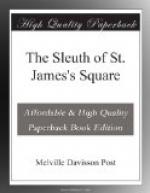“Because there was nothing in them of value, sir,” replied the lad.
“What is in them?” said my father.
“Only old letters, sir, written to my father, when I was in Paris - nothing else.”
“And who would know that?” said my father.
The boy went suddenly white.
“Precisely!” said my father. “You alone knew it, and when you undertook to give this library the appearance of a pillaged room, you unconsciously endowed your imaginary robber with the thing you knew yourself. Why search for loot in drawers that contained only old letters? So your imaginary robber reasoned, knowing what you knew. But a real robber, having no such knowledge, would have ransacked them lest he miss the things of value that he searched for.”
He paused, his eyes on the lad, his voice deep and gentle.
“Where is the will?” he said.
The white in the boy’s face changed to scarlet. He looked a moment about him in a sort of terror; then he lifted his head and put back his shoulders. He crossed the room to a bookcase, took down a volume, opened it and brought out a sheet of folded foolscap. He stood up and faced my father and the men about the room.
“This man,” he said, indicating Gosford, “has no right to take all my father had. He persuaded my father and was trusted by him. But I did not trust him. My father saw this plan in a light that I did not see it, but I did not oppose him. If he wished to use his fortune to help our country in the thing which he thought he foresaw, I was willing for him to do it.
“But,” he cried, “somebody deceived me, and I will not believe that it was my father. He told me all about this thing. I had not the health to fight for our country, when the time came, he said, and as he had no other son, our fortune must go to that purpose in our stead. But my father was just. He said that a portion would be set aside for me, and the remainder turned over to Mr. Gosford. But this will gives all to Mr. Gosford and leaves me nothing!”
Then he came forward and put the paper in my father’s hand. There was silence except for the sharp voice of Mr. Gosford.
“I think there will be a criminal proceeding here!”
My father handed the paper to Lewis, who unfolded it and read it aloud. It directed the estate of Peyton Marshall to be sold, the sum of fifty thousand dollars paid to Anthony Gosford and the remainder to the son.
“But there will be no remainder,” cried young Marshall. “My father’s estate is worth precisely that sum. He valued it very carefully, item by item, and that is exactly the amount it came to.”
“Nevertheless,” said Lewis, “the will reads that way. It is in legal form, written in Marshall’s hand, and signed with his signature, and sealed. Will you examine it, gentlemen? There can be no question of the writing or the signature.”
My father took the paper and read it slowly, and old Gaeki nosed it over my father’s arm, his eyes searching the structure of each word, while Mr. Gosford sat back comfortably in his chair like one elevated to a victory.




